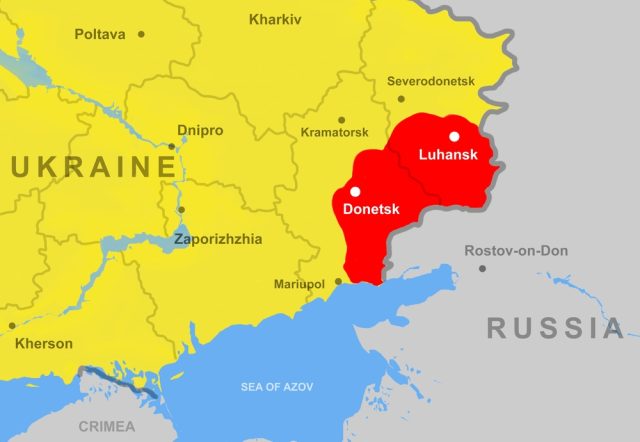
Voting began on Friday 23 September for the referendums wanted by Moscow. Considered illegal in Ukraine, the referendums have already been branded a ‘farce’ in the West.
Four regions occupied by the Russian army and separatist militias were called to vote on whether or not to be annexed to the Russian Federation: Lugansk, Donetsk, Zaporizhzhia and Kherson.
In the separatist republics of Donetsk and Lugansk, which had already proclaimed themselves independent of Ukraine in 2014, the referendum question put to the citizens concerned their will to be annexed to the Russian Federation. In the regions of Zaporizhzhia and Kherson, conquered by the Russians in these months of war, citizens were asked to vote both on independence from Ukraine and for annexation to Russia.
On Tuesday 27 September, the results were announced: 95% of the voters said yes to annexation. The outcome was a foregone conclusion, as was the case in Crimea in 2014. Of course, it is difficult to consider the right to vote exercised in a war zone, manned by partisan militias, as ‘free’. The European Union is ready to impose new economic sanctions against Putin’s Russia, the US government is on the same line. The EU executive is also reportedly considering individual sanctions against European citizens who took part in the referendum as observers.
On Friday, 4 October, the Russian Duma is scheduled to hold a ratification vote and, on that occasion, Putin could officially announce the annexation of Donetsk, Lugansk, Zaporizhzhia and Kherson, which, together with Crimea, would become the ninth district of the Russian Federation.
The possible annexation would make a war that has already claimed many lives and destroyed entire cities even more dramatic. For the Russians, the strenuous defence of the Ukrainian army would instantly turn into an aggression against Russian sovereignty, thus legitimising the use of any means, even nuclear weapons.
No member of the international community has recognised the validity of these referendums yet. The only one who has said he is ready to recognise the new Russian borders is Belarusian President Lukashenko.
Albania and the United States of America have already announced the submission of a condemnatory resolution to the UN Security Council. Little more than a signal, certainly, considering the veto that would be placed by Russia, but important in defining the international balance. It will be interesting, in fact, to see what positions key states such as China will take. At the opening of the session, Rosemary Di Carlo, Under-Secretary General for Political and Peacebuilding Affairs at the UN, immediately clarified the position of the UN Headquarters, defining the Donbass referendums as illegal under international law because they were organised in an area of war. Di Carlo also said that the war crimes perpetrated by the Russians in Ukraine were evident and that justice must be done by prosecuting those responsible wherever they are.
Volodymyr Zelensky also spoke at the Security Council meeting: ‘This is an institution founded on respect for rules, but there are those in this room who have violently trampled the rules everywhere. Who knows when they will start doing it in there too, knocking chairs to the floor. No one will be surprised when Russia’s representatives also turn the Security Council into a violent place,’ said the Ukrainian President.
For Linda Thomas-Greenfield, US Ambassador to the UN, Russia is contravening the core principles of the UN, namely respect for peace, sovereignty and territorial integrity, by organising sham referendums in which citizens are forced to vote at gunpoint. For the ambassador, the referendums are Putin’s attempt to legitimise the annexation of territories that belong to another state. Thomas-Greenfield was very clear: “[T]he United States will never recognise any territory that Russia attempts to conquer or allegedly annex as belonging to Ukraine”. For the US, Ukraine is the victim and must be defended boldly. “That is why we will introduce a resolution condemning these bogus referenda, calling on member states not to recognise any altered status of Ukraine and forcing Russia to withdraw its troops from Ukraine. Russia’s bogus referendum, if accepted, will open a Pandora’s box that we cannot close. We ask you to join us in reaffirming our commitment to the UN Charter and confronting this challenge head-on,” the US ambassador concluded.
In his reply, Russian Ambassador Vasily Nebenzya returned all accusations to the sender, branding the positions of the Western nations as ‘propaganda’.
From the very beginning, the European Conservatives and Reformists have supported Ukraine in its struggle for freedom and independence against Russian imperialism. There have been numerous stances on the issue during these eight months of war and initiatives in the European Parliament to condemn the war and support the Ukrainian resistance.
The ECR Group also wanted to nominate Ukrainian President Volodymyr Zelensky for the ‘Sakharov Prize for Freedom of Thought 2022’, embodying the soul of the strenuous Ukrainian resistance against the brutal Russian aggression.
The next few hours will be crucial. If Russian President Putin declares the Donbass annexed, a new scenario will open up and the West will be called upon to consider, perhaps, new and more incisive measures to respond to Russian actions. Peace, unfortunately, seems ever more distant.



 Subscribe
Subscribe